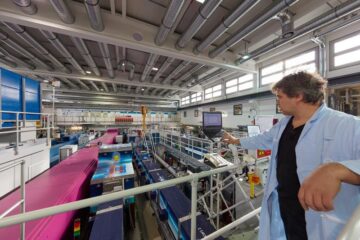“PCGP” – Polymer-Conjugate Technology for the Rapid Chemoenzymatic Synthesis of Glycopeptides

Glycosylation is known to play a key role in numerous biological and biochemical functions such as, e.g. protein folding, cell-cell communication, cellular differentiation, cell-matrix interaction and viral invasion. Moreover, the glycosylation pattern of a peptide may have a great impact on the immunogenicity and the proteolytic stability of said peptide. A glycopeptide itself and/or a carbohydrate moiety cleaved off said glycopeptide may serve as an epitope.
So far, glycopeptides are mostly obtained from natural sources. However, purification of said peptides is highly challenging and laborious. The glycopeptides found in nature are mostly proteins of more than 100 amino acids in length, often comprising more than one glycosylation site(s) and their glycosylation pattern cannot be fully controlled. Therefore, there is still the need for efficient methods for producing glycopeptides by synthetical means. Currently, there are two common strategies for the chemical synthesis of glycopeptides known in the art. According to the first strategy, a peptide strand is synthesized and, during the synthesis of said peptide, one or more glycosylated amino acid building block(s) are integrated in the sequence instead of standard amino acids. According to the second strategy, a peptide is first fully synthesized, then, subsequently, one or more protecting groups are cleaved off selectively and the carbohydrate building block is conjugated to the peptide. Both strategies bear several severe drawbacks. The present invention relates to a method for the production of glycosylated peptides conjugated with one or more hydrophilic polymer(s) and glycosylating the polymer-conjugated peptide by means of one or more glycosyltransferase(s).
Weitere Informationen: PDF
PROvendis GmbH
Tel.: +49 (0)208/94105 10
Ansprechpartner
Dipl.-Ing. Alfred Schillert
Media Contact
Alle Nachrichten aus der Kategorie: Technologieangebote
Neueste Beiträge

Bakterien für klimaneutrale Chemikalien der Zukunft
Forschende an der ETH Zürich haben Bakterien im Labor so herangezüchtet, dass sie Methanol effizient verwerten können. Jetzt lässt sich der Stoffwechsel dieser Bakterien anzapfen, um wertvolle Produkte herzustellen, die…

Batterien: Heute die Materialien von morgen modellieren
Welche Faktoren bestimmen, wie schnell sich eine Batterie laden lässt? Dieser und weiteren Fragen gehen Forschende am Karlsruher Institut für Technologie (KIT) mit computergestützten Simulationen nach. Mikrostrukturmodelle tragen dazu bei,…

Porosität von Sedimentgestein mit Neutronen untersucht
Forschung am FRM II zu geologischen Lagerstätten. Dauerhafte unterirdische Lagerung von CO2 Poren so klein wie Bakterien Porenmessung mit Neutronen auf den Nanometer genau Ob Sedimentgesteine fossile Kohlenwasserstoffe speichern können…

















